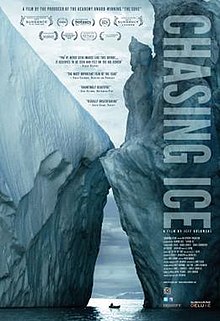Chasing Ice
| Chasing Ice | |
|---|---|

Theatrical release poster
|
|
| Directed by | Jeff Orlowski |
| Produced by | Paula DuPre' Pesemen, Jerry Aronson |
| Written by | Mark Monroe |
| Music by | J. Ralph |
| Cinematography | Jeff Orlowski |
| Edited by | Davis Coombe |
| Distributed by | Submarine Deluxe |
|
Release date
|
|
|
Running time
|
75 min |
| Country | United States |
| Language | English |
| Box office | $1,331,836 |
Chasing Ice is a 2012 documentary film about the efforts of nature photographer James Balog and his Extreme Ice Survey (EIS) to publicize the effects of climate change, directed by Jeff Orlowski. It was released in the United States on November 16, 2012.
The documentary includes scenes from a glacier calving event that took place at Jakobshavn Glacier in Greenland, lasting 75 minutes, the longest such event ever captured on film. Two EIS videographers waited several weeks in a small tent overlooking the glacier, and were finally able to witness 7.4 cubic kilometres (1.8 cu mi) of ice crashing off the glacier. "The calving of a massive glacier believed to have produced the ice that sank the Titanic is like watching a city break apart."
Environmental photographer James Balog heads to Greenland, Iceland and Alaska in order to capture images that will help to convey the effects of global warming. Balog was initially skeptical about climate change when the issue entered scientific discussion, but after his first trip north, he becomes convinced of the impact that humans have on the planet and becomes committed to bringing the story to the public.
Within months of the first trip to Iceland, Balog initiates The Extreme Ice Survey - an expedition to collect data on the seasonal changes of glaciers. Balog and his team deploy cameras that utilize time-lapse photography across various places in the Arctic to capture a multi-year record of the world’s glaciers.
The expedition starts off poorly as the team is plagued by numerous technical problems and camera malfunctions. Meanwhile, due to the extreme physical nature of the expeditions, Balog's personal health suffers in the form of knee complications.
After making improvements to the equipment, Balog and his team are finally able to collect time-lapse photos that depict the drastic erosion and disappearance of enormous, ancient glaciers.
...
Wikipedia
